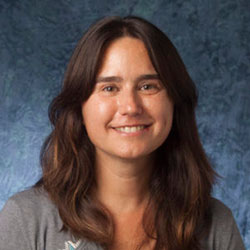Christensen Lecture Series Features Wisconsin Professor Sept. 28 at UW
Published September 19, 2023

Anne Pringle, the Mary Herman Rubinstein Professor at the University of Wisconsin, will give two talks during the fifth annual Martha Christensen Memorial Lecture Series Thursday, Sept. 28, at the University of Wyoming.
She will discuss -- in a professional lecture -- “Rethinking Baker’s articulation of an ‘ideal weed’ with fungi: What enables nonpathogenic fungi to invade new habitats?” from noon-1 p.m. in Room 142 of the Classroom Building. Pringle’s second free public lecture titled “The Problem of Invasive Mycorrhizal Fungi” is from 7-8 p.m., also in the Berry Center auditorium.
In her first talk, Pringle cites the work of Herbert Baker, a professor emeritus of integrative biology at the University of California-Berkeley, who articulated his vision of an “ideal weed.” The weed would grow quickly, flower rapidly and reproduce copiously; it might possess allelochemicals; it would be self-compatible but not completely.
Taking a similar approach, Pringle is using the death cap mushroom -- Amanita phalloides -- as a model to articulate an “ideal” fungal invasive, basing analyses on population genomics data generated from an invasive California population and from across the European range to draw parallels between the two kingdoms, extending the general rules of “ideal weeds.”
In her second talk, Pringle says that plants in nature grow symbiotically with mycorrhizal fungi, and foresters and arborists routinely use mycorrhizal inocula to grow trees more quickly. Home gardeners increasingly use mycorrhizal fungi as well. But, inoculations with these “biofertilizers” have accelerated the movement of mycorrhizal fungi among continents; plantations and gardens are hotbeds of introduced fungi, she says.
In her talk, Pringle will focus on alternatives to importing fungi or using biofertilizers. She also will discuss whether it is possible for scientists to collect baseline data documenting fungal biodiversity.
About the Martha Christensen Memorial Lecture Series
The Martha Christensen Memorial Lectures were created shortly after she died March 17, 2017, at age 85. The program was funded largely by contributions from her former students and many friends. Additionally, her twin brother, James, contributed the lion’s share, which brought the fund to maturity.
Christensen was a mycologist, primarily studying soil microfungi, but she also was known for her contribution to penicillin research, primarily in the identification of effective species and strains of penicillium. However, she was first an ecologist from the University of Wisconsin School of Human Ecology, and most of her work had a decidedly ecological bent. She also was an avid naturalist and crusader for species and habitat preservation.
Christensen was hired at the University of Wyoming in 1963 and had an exemplary career in teaching and research until her retirement in 1989. She was an outstanding teacher and researcher of mycology. She was the first woman faculty member to be hired in the Department of Botany.
As her career as a mycologist and microbial ecologist evolved, Christensen navigated the academic ladder with distinction, first becoming an outstanding teacher of not only mycology, but also botanical subjects including dendrology, phycology, plant morphology and general botany. She became a truly unique researcher whose expanded scope of scientific interests and knowledge embraced not only the subjects of taxonomy, plant pathology and applied botany, but also of ecology, which, at that time, was a scientific discipline reserved primarily for men.
For more information, email UW botany Professor Steve Miller at fungi@uwyo.edu.

